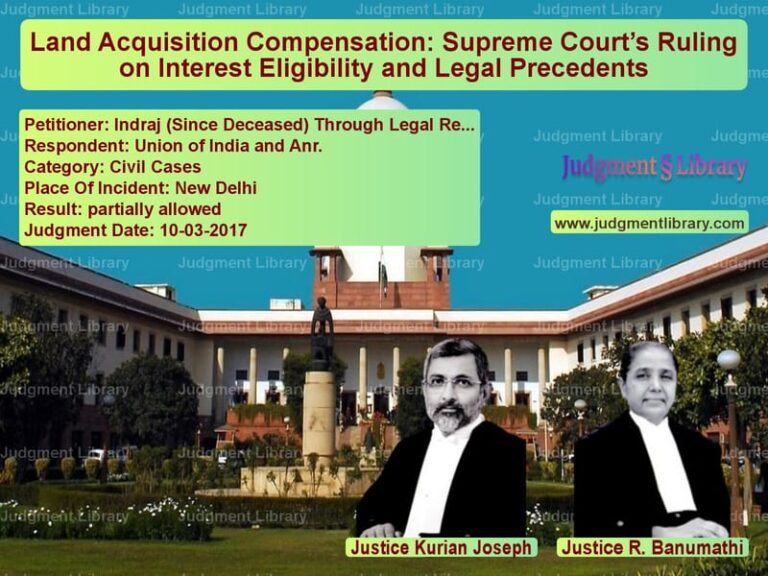Supreme Court Strikes Down Bail Condition Requiring Monetary Deposit
The case of Saravanan vs. State Represented by the Inspector of Police is a significant ruling by the Supreme Court of India that addresses the issue of bail conditions imposing monetary deposit requirements. The Court examined whether imposing financial obligations as a condition for bail is permissible under the law.
The judgment reinforces the principle that an accused has a statutory right to default bail under Section 167(2) of the Criminal Procedure Code (CrPC) when the prosecution fails to file a chargesheet within the stipulated time. The ruling makes it clear that bail conditions should not include financial burdens that could effectively deny the accused their right to liberty.
Background of the Case
The appellant, Saravanan, was arrested on 31 January 2020 in connection with Crime No. 31 of 2019 under Section 420 of the IPC at the District Crime Branch (DCB) Police Station, Kanyakumari District. He was accused of cheating in a financial transaction amounting to Rs. 15,67,338.
Key litigation history:
- The appellant initially applied for regular bail under Section 437 CrPC, which was granted by the Judicial Magistrate, Nagercoil, on 3 February 2020.
- As a condition for bail, the Magistrate directed the appellant to deposit Rs. 7,00,000 and the balance of Rs. 8,67,338 before 6 April 2020.
- The appellant challenged this financial condition before the Madras High Court, which dismissed the petition on 24 June 2020.
- Subsequently, he applied for default bail/statutory bail under Section 167(2) CrPC, arguing that the police failed to file a chargesheet within the prescribed time.
- The Sessions Court rejected his application, stating that he had not complied with the earlier bail conditions.
- The Madras High Court granted him default bail but imposed a fresh condition to deposit Rs. 8,00,000 before the Magistrate.
- The appellant challenged this condition before the Supreme Court.
Petitioner’s (Saravanan) Arguments
The petitioner, represented by senior advocate S. Gurumurthy, argued:
- The condition to deposit Rs. 8,00,000 while granting default bail was illegal and contrary to established legal principles.
- Under Section 167(2) CrPC, an accused is entitled to bail if the investigation is not completed within the statutory time limit.
- The imposition of a financial burden violates the principle that bail should not be used as a means of coercion for financial recovery.
- The High Court erred in considering an earlier affidavit filed by the appellant’s wife, which was related to his regular bail and not statutory bail.
Respondents’ (State Represented by the Inspector of Police) Arguments
The respondents, represented by Additional Advocate General Jayanth Muthuraj, countered:
- The amount was directed to be deposited based on an affidavit filed by the appellant’s wife during his earlier bail proceedings.
- The case involved financial fraud, and ensuring recovery of the cheated amount was in the interest of justice.
- The imposition of conditions for bail lies within the discretion of the High Court.
Supreme Court’s Observations and Judgment
The Supreme Court, led by Justices Ashok Bhushan, R. Subhash Reddy, and M.R. Shah, made the following key observations:
- Right to Default Bail Is Absolute: The Court reiterated that once the conditions under Section 167(2) CrPC are met, the accused has an “indefeasible right” to bail.
- Financial Conditions Cannot Be Imposed: Bail conditions should not include monetary deposits, as they could effectively deny bail to an accused who cannot afford them.
- Irrelevance of Prior Undertakings: The affidavit filed by the appellant’s wife during regular bail proceedings had no bearing on the appellant’s right to default bail.
- Harsh Reporting Condition Also Modified: The Court also found the condition requiring the appellant to report to the police station daily at 10:00 a.m. to be excessive and modified it.
Final Judgment
The Supreme Court ruled:
- The condition imposed by the High Court requiring the appellant to deposit Rs. 8,00,000 for bail was quashed.
- The appellant’s bail was confirmed without any financial deposit.
- The condition requiring him to report daily at the police station was modified to “as and when required.”
- The appeal was allowed, and the appellant was granted relief.
Conclusion
The Supreme Court’s ruling ensures that bail conditions do not become a tool for economic coercion. By reaffirming the absolute right to default bail, the judgment protects the constitutional guarantee of personal liberty under Article 21. This case sets a precedent for ensuring that financial barriers do not hinder an individual’s right to freedom when statutory bail conditions are met.
Petitioner Name: Saravanan.Respondent Name: State Represented by the Inspector of Police.Judgment By: Justice Ashok Bhushan, Justice R. Subhash Reddy, Justice M.R. Shah.Place Of Incident: Kanyakumari, Tamil Nadu.Judgment Date: 15-10-2020.
Don’t miss out on the full details! Download the complete judgment in PDF format below and gain valuable insights instantly!
Download Judgment: Saravanan vs State Represented by Supreme Court of India Judgment Dated 15-10-2020.pdf
Direct Downlaod Judgment: Direct downlaod this Judgment
See all petitions in Bail and Anticipatory Bail
See all petitions in Fraud and Forgery
See all petitions in Judgment by Ashok Bhushan
See all petitions in Judgment by R. Subhash Reddy
See all petitions in Judgment by Mukeshkumar Rasikbhai Shah
See all petitions in allowed
See all petitions in Quashed
See all petitions in supreme court of India judgments October 2020
See all petitions in 2020 judgments
See all posts in Criminal Cases Category
See all allowed petitions in Criminal Cases Category
See all Dismissed petitions in Criminal Cases Category
See all partially allowed petitions in Criminal Cases Category







